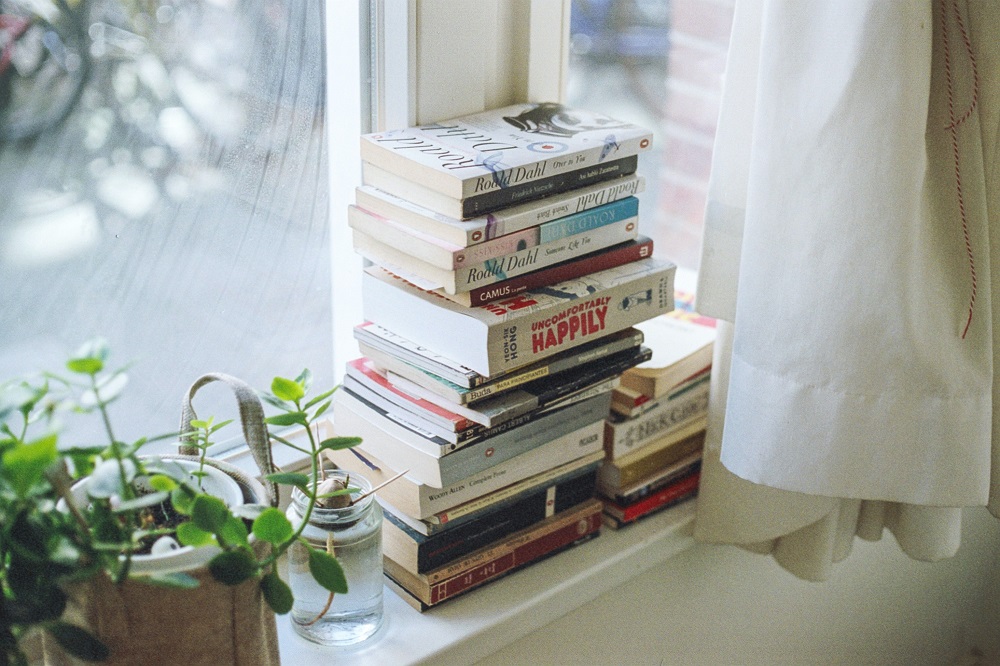If you’re an avid reader, chances are you have piles of books stacked away in your home, and it can be surprising how much space they actually need. New titles you haven’t got around to reading yet, old favourites and friends’ recommendations can all start stacking up, and soon you’ll need a savvy way to store these away. We’ve listed some handy ways you can store books safely to ensure they are ready to read for years to come.

Tips for storing books in your home
If you have a large volume of books, storing them at home can seem tricky, but there are plenty of hidden and additional spaces which you can use to keep your books safe. When looking at where to place your books, never overcrowd as this can cause significant damage over time. Always keep away from direct sunlight and don’t remove the dust jackets, as these really do help to protect your books in the long run.
Shelves and smart storage
Finding additional space at home is typically one of the biggest challenges which can sometimes become a Tetris game of fitting things wherever the space allows. Shelves are an optimal way of using that precious wall space to showcase books, games and nick-nacks. Shelves allow you to lay out your books in a safe way, where they won’t be damaged.
Storage benches provide an additional place for books, as well as doubling up as somewhere to sit, or rest your feet on. The added benefit of a bench is your books are kept covered and safely away from children and pets.
Get creative and find spaces for book storage. Do you have any unused ledges (away from sunlight) such as on your stairs? These make the perfect book nooks which brighten up any room. Revolving bookshelves are a unique and charming way of maximising your storage space and allow you to change your view with ease.
Look around your house for those small unused spaces which have so much potential. Slim bookshelves can fit behind doors, utilising an otherwise vacant space. Have you got a nook in your home which is left unused? Books are small enough that they can snugly fit into gaps which other items just wouldn’t work in.
Use as décor
Books can really change the aesthetic of a room and is a subtle way to show off your taste when guests come over. Coffee table books are the ‘in’ thing for those who want to show off their bright, glossy covers whereas a traditional oak bookshelf is better suited to more traditional tales. If you don’t have a lot of room, floating shelves can be purchased cheaply and attached easily providing additional storage as well as a nice touch to a room.
Vertical stacking
Stacking books horizontally might seem a good idea to save space, but this method puts a lot of pressure on the spines of the covers, wearing them out over time. Setting books out vertically looks far neater and protects your books. Bonus points for colour coordinating or alphabetical listing for added aesthetics!
Appropriate climate control
When storing anything, you want to make sure the temperature is right. It really can affect items more than you think. Leaving books anywhere in direct sunlight can damage the colours and leave the pages to deteriorate. If you’re storing books at home, you want to make sure you’re keeping them somewhere at a level temperature, away from sunlight. The British Library recommends around 16º – 19ºc if possible. If you plan to keep all your books in one room, a cheap thermometer can make sure you keep the space at a level temperature. A work-from-home office at the back of the house would be an ideal space for book storage.
Attic space
Of course, a trusty attic space is ideal to store your books, however, you will want to go in and check it’s suitable before you put precious books there. Go up and make sure there are no leaks or dampness in your attic. Getting books wet is extremely damaging and can lead to disrepair, so be sure the space is clean and dry. Always keep books in a container. It doesn’t need to be anything expensive, a simple plastic container which seals tightly will protect your books and keep them free from any moisture. Consider ordering them by author or topic so that when it comes to unpacking your books, you know exactly what’s there.

Tips for storing books in long-term storage
As a more delicate item, books aren’t the sort of thing you can stuff away haphazardly into a cupboard, and leaving books in a damp garage or leaky shed will lead to inevitable damage. Finding a storage solution which is both dry, secure and of a level temperature preserves your precious pages and keeps your books in better condition.
Make sure your books aren’t damaged
If one of your books is damaged when you store it, this can soon spread to the other books in your collection. So, before you’ve even thought about how to store your books, you’ll want to make sure they are in a good condition. We all love a hot drink whilst poring over a book, so it’s best to double check there’s no moisture, crumbs or debris trapped between the pages. If you haven’t got a bookmark handy, some of the pages might be dog-eared. Have a flick through and smooth down any pages, checking for damage along the way. Once you’re satisfied that your books are in good condition, it’s time to think about storage.
Individually wrap each book
If you’re serious about protecting your books or have classics which hold value, individually wrapping each book is the best way to protect and prevent damage. It’s easier than you might think! Add a layer of protection with acid-free archive paper. This will stop moisture from being trapped inside and won’t leave any marks on the book like bubble wrap or newspaper would. Be sure to wrap your book firmly, but not so tightly that it will lose its shape over time.
Use a cardboard or plastic box
Boxes are an inexpensive way of keeping your books all in one place. A simple plastic box with a tight seal will protect the contents from external moisture. Save silica gel packets and pop these inside the box for added damp protection.
Store your books vertically!
Laying books on top of each other can cause the spines to be pushed out of joint and the pages to get crushed. Where possible, store them vertically as this allows the books to breathe, and makes it easier to find any you might want to remove from storage.
Regular checks
It’s always good to keep an eye on your books. Choosing a storage solution with easy access makes it easier to check them from time to time so that any potential damage can be immediately addressed.
Considering Titan Self StorageIf you’ve got an abundance of books which need safe storage, at Titan, we have a range of short and long-term storage solutions in a range of sizes. From the size of a locker to a mini-warehouse, we can support all your storage needs. Get in touch with our friendly team today to find out more.